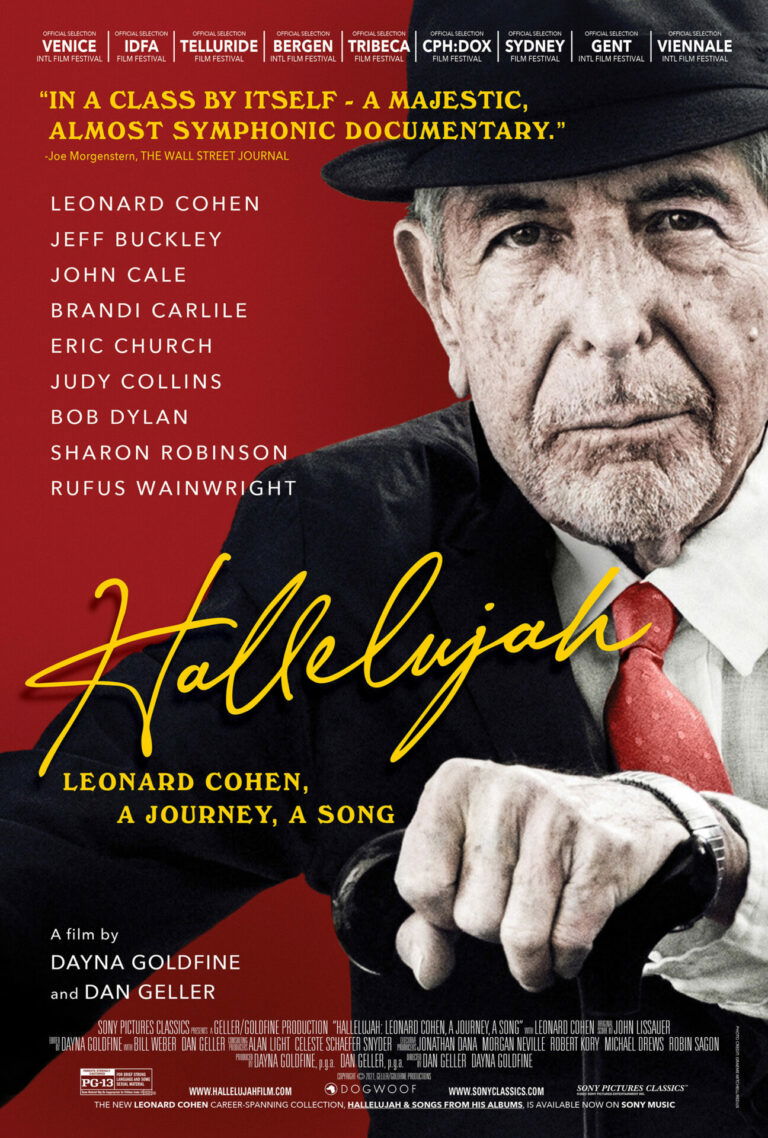"Revealing and Sometimes Uplifting"

| None | Light | Moderate | Heavy | |
|---|---|---|---|---|
| Language | ||||
| Violence | ||||
| Sex | ||||
| Nudity |
What You Need To Know:
HALLELUJAH: LEONARD COHEN, A JOURNEY, A SONG is a revealing, sometimes uplifting movie about the man behind the famous song. The movie stresses Cohen’s Jewish roots and the spiritual, biblical aspects in some of his music and lyrics. However, it also mentions there are secular, non-religious aspects to Cohen’s music and lyrics. HALLELUJAH the movie has brief foul language, a few sexual lyrics and discusses Cohen’s five-year meditation sabbatical at a Zen Buddhist monastery. MOVIEGUIDE® advises extreme caution, though the movie contains no specific Buddhist theology. Cohen just says in HALLELUJAH that the meditation gave him some clarity and helped with his depression.
Content:
More Detail:
HALLELUJAH: LEONARD COHEN, A JOURNEY, A SONG is an interesting documentary about Leonard Cohen, the writer of the popular song “Hallelujah,” a song that’s graced several major movies, including two MOVIEGUIDE® Award winning animated movies, SHREK and SING. HALLELUJAH, the documentary, is a revealing, sometimes uplifting movie about the man behind the song and sometimes stresses the Jewish aspects to Cohen’s life and work, but it has brief foul language, a few sexual lyrics and discusses Cohen’s five-year meditation sabbatical at a Zen Buddhist monastery, though Cohen only talks vaguely about the meditation and just mentions the psychological “clarity” it brought to him and that it alleviated his depression.
The movie consists of many interviews with Cohen about his life and work from the late 1960s to about a year or so before his death in 2016. It also has many clips from his concerts. He started as a poet, then started to write songs to them. In 1966, singer-songwriter Judy Collins had a hit singing his song, “Suzanne,” and she encouraged him to sing his own songs. Eventually, he recorded 15 albums, performed sold-out concerts all over the world, published more than 15 poetry collections, and wrote three novels.
The movie also consists of interviews with friends, including Collins, several album producers and engineers, Cohen’s rabbi, and a music journalist who interviewed Cohen many times over the years. In addition, several other musical artists weigh in on Cohen’s music, including Bob Dylan and John Cale of The Velvet Underground, who had a minor hit in 1991 singing a version of “Hallelujah.” Cohen worked on the song for at least eight years before he recorded it in 1984. However, it wasn’t until 1991, when DreamWorks used the song in the movie SHREK that the song’s popularity
In the last part of the documentary, Cohen says he had to go back to performing extensively on tour in 2005, because his business manager had stolen most of his retirement money. The movie shows some montages of his final concerts. However, it focuses on an Old Testament blessing used weekly in liturgical Christian denominations that he gave a the end of a 2009 concert in Israel: “May the Lord bless you and guard you. May the Lord make his face shine upon you and be gracious unto you. May the Lord lift up His face and give you peace.” (Numbers 6:24-26) It also includes a performance he gave of “Hallelujah” at the Coachella Music Festival in 2009, which he ends by singing the most faithful part of the song, “I’ll come before the Lord of Song with nothing on my lips [or tongue] but ‘Hallelujah.’”
HALLELUJAH: LEONARD COHEN, A JOURNEY, A SONG is a revealing, sometimes uplifting movie about the man behind the famous song. The movie stresses Cohen’s Jewish roots and the spiritual aspects in some of his music and lyrics. However, it also mentions that there are secular, non-religious aspects to his music and lyrics. A few explicit, sexual references in his lyrics are recited. For example, Cohen uses the word “Hallelujah” to express both love for God and sexual love. Still, in the end, it’s the spiritual, positive connotations to the word that come to the fore.
On the negative side, the movie discusses a five-year sabbatical that Cohen took between the ages of 60 and 64 to a famous Zen Buddhist monastery in California. The sabbatical included rigorous training in a kind of meditation. Neither Cohen nor the movie, however, detail the specific theological content of the meditation. Cohen says, though, that the meditation gave him some psychological “clarity” that helped relieve the depression he was feeling at that time of his life. MOVIEGUIDE’s research into the monastery and its founder revealed that there is false Buddhist theology in the monastery’s meditation teachings and practices. So, it’s good that the movie doesn’t get into any of the specifics.
Besides its rather vague references to Zen Buddhism and meditation, HALLELUJAH the movie also contains brief foul language, including one “f” word, and a few sexual, romantic lyrics. So, MOVIEGUIDE® advises extreme caution.



 - Content:
- Content: 



